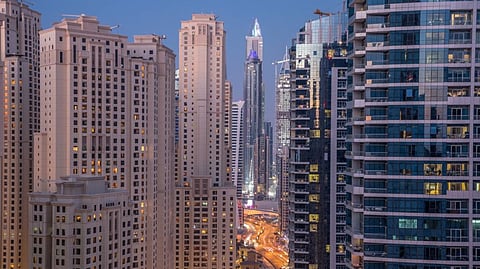Don’t expect Dubai property prices to go up too quickly
While there are enquiries, people are not in a hurry to invest

The message is loud and clear from UAE real estate experts: the significant levels of volatility in the economy is likely to remain for the foreseeable future, so don’t expect property prices to go up anytime in the next year, but keep an eye out for opportunities in buying and renting. Along with tourism, hospitality and other industries, wholesale and retail trade, transport and logistics, the impact of Covid-19 on real estate has also been significant as a result of severely impinged economic activity and extended cuts in Opec oil production.
Selling close to cost
John Stevens, managing director of Asteco Property Management, says sales prices and rental rates have come under significant pressure. “We hear developers selling products close to cost at almost Dh650 per square foot. How much further can you go after this?”
Mahmoud AlBurai, vice-president of the International Real Estate Federation of Arab Countries, sees this as a buyer’s market with more opportunities. “Maybe the Dubai Expo next year will be a turning point for a stronger real estate market as demand will start to pick up driven by the influx of tourists and trade,” he says.
Delay in completion
A recent Knight Frank Middle East UAE market pulse survey on the responses and strategies for the Covid-19 pandemic states that close to 90 per cent of residential projects that were under construction before the pandemic are still proceeding. Construction contracts may see delays in completion due to developer-induced postponements or interruptions in logistics of both labour as well as construction materials, the report said. Developers are largely taking a “wait and watch” approach when it comes to projects that were under planning, with an overwhelming majority of projects being either put on hold (50 per cent) or proceeding with expected delays (37.5 per cent).
PP Varghese, partner, real estate strategy and consultancy at Knight Frank Middle East, says: “The key question developers need answered prior to moving forward with planned projects is whether the fundamentals of the market will change in the post-Covid era.”
More discounts, incentives
Stevens expects a lot more incentives in the market. “We are already hearing of three-month rent-free offers, waiver of agency fees, lower or deferred security deposits, monthly rental payments, easier payment plans and so on.”
Taimur Khan, head of residential at Knight Frank, agrees. “As supply increases, rental rates, which fell by 9.2 per cent in the year to March, are likely to continue to soften significantly throughout 2020.”
The number of off-plan project launches will also decline, adds Stevens. “But there will be better finance options. Lower interest rates may stimulate the secondary market and result in a rise in end users.”
Affordable and available
Firas Al Msaddi, CEO of Fam Properties, says the secondary market is now picking up at the expense of off-plan properties. “Everything in the market now is affordable and everything is available,” says Msaddi.
More people also now realise the importance of a bigger space with demand for larger apartments and upgrades to villas and town houses seeing an upward trend. A report by the International Property Institute says Covid-19 made it important to have spacious apartments with balconies, as well as green features, sports facilities and walkable/biking areas.
“There are a lot of enquiries, but people are not in a hurry to invest,” says Msaddi. “It is also interesting to see that sellers are not as desperate to sell as we had seen in 2009. We do not have crazy distressed sales in this market like we saw during the earlier financial downturn. One of the reasons could be that people who have purchased property during the slow years of 2016 and 2019 have been genuine buyers and not speculators.”
Sign up for the Daily Briefing
Get the latest news and updates straight to your inbox



